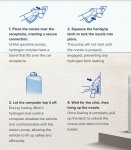- Joined
- Jul 19, 2014
- Messages
- 62,963
- Reaction score
- 27,366
- Gender
- Male
- Political Leaning
- Undisclosed
Well, I'm not attempting to minimize recent developments. I want fusion to be feasible. But read the article very carefully anyway.
The golden meatball is fraught with a lot of side issues.
Just the fact that we're still trying for tritium-deuterium reactions is problematic.
Recent developments are still in the area of tritium-deuterium reactions, yes?
There are some that are. However, no. The stellerator for example that is not true. While that is not being abandoned, it's not being used exclusively by any means.

